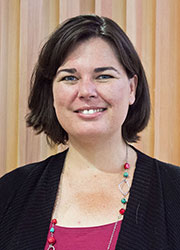PEHSU Grand Rounds Webinar
This webinar is part of an ongoing series of educational presentations by experts on issues that focus on current and emerging aspects of pediatric and reproductive environmental health.
Old Poison, New Findings: Arsenic’s effect on maternal and child health - June 29, 2016
Learning Objectives
- Describe how people can be exposed to arsenic
- Evaluate the epidemiological evidence linking in utero and early life exposures to adverse pregnancy outcomes and children's health
- Recommend ways to reduce exposure to arsenic
Presenter: Molly Kile, ScD
 Molly Kile, ScD
Molly Kile, ScDDr. Kile is an environmental epidemiologist whose research focuses on understanding how exposures to chemicals influence human health. She is also interested in how chemicals interact with host factors (e.g. behavior, diet, microbiota, genetic and epigenetic) to modify susceptibility to disease. She received her doctoral degree from Harvard School of Public Health in 2006 and is currently an Assistant Professor at the College of Public Health and Human Sciences at Oregon State University. The majority of her research to date has been evaluating the health effects associated with arsenic exposure. She been involved with many epidemiological studies conducted in Bangladesh that have looked at a variety of health outcomes including skin lesions, reproductive outcomes, neurodevelopmental outcomes, and metabolic diseases. She is also the new director of the Community Engagement Core of Oregon State University’s Superfund Research Center where she works with Native American Tribes to investigate their concerns regarding environmental pollution.
Webinar Recording and Materials
Continuing Education
- First establish a login with the CDC if you have not already. Click here to access the CDC Training and Continuing Education Online webpage.
- Complete the activity
- Complete the Evaluation at www.cdc.gov/TCEOnline
- Pass the posttest at 80% at www.cdc.gov/TCEOnline (Posttest consists of a mix of five multiple choice and true/false questions.)
ACCREDITATION STATEMENTS:
CME activities with Joint Providers: This activity has been planned and implemented in accordance with the Essential Areas and policies of the Accreditation Council for Continuing Medical Education through the joint providership of the Centers for Disease Control and Prevention and the American College of Medical Toxicology. The Centers for Disease Control and Prevention is accredited by the (ACCME®) to provide medical education for physicians. Physicians should claim only the credit commensurate with the extent of their participation in the activity.
Regarding WC2588 - The Centers for Disease Control and Prevention designates this live educational activity for a maximum of 1.0 AMA PRA Category 1 Credits™.
Regarding WD2588 - The Centers for Disease Control and Prevention designates this enduring material for a maximum of 1.0 AMA PRA Category 1 Credits™.
Other Credit types:
- CNE: The Centers for Disease Control and Prevention is accredited as a provider of Continuing Nursing Education by the American Nurses Credentialing Center's Commission on Accreditation.This activity provides 1.0 contact hours.
- CEU: The Centers for Disease Control and Prevention is authorized by IACET to offer 1.0 CEU's for this program.
- CECH: Sponsored by the Centers for Disease Control and Prevention, a designated provider of continuing education contact hours (CECH) in health education by the National Commission for Health Education Credentialing, Inc. This program is designated for Certified Health Education Specialists (CHES) and/or Master Certified Health Education Specialists (MCHES) to receive up to 1.0 total Category I continuing education contact hours. Maximum advanced level continuing education contact hours available are 0. CDC provider number 98614.
- For Certified Public Health Professionals (CPH)
CDC is an approved provider of CPH Recertification Credits by the National Board of Public Health Examiners. Effective October 1, 2013, the National Board of Public Health Examiners (NBPHE) accepts continuing education units (CEU) for CPH recertification credits from CDC. Please select CEU as your choice for continuing education when registering for a course on TCEOnline. Learners seeking CPH should use the guidelines provided by the NBPHE for calculating recertification credits. For assistance please contact NBPHE at http://www.NBPHE.org.
Disclaimers
Acknowledgement: The U.S. Environmental Protection Agency (EPA) supports the PEHSU by providing partial funding to ATSDR under Inter-Agency Agreement number DW-75-92301301. Neither EPA nor ATSDR endorse the purchase of any commercial products or services mentioned in PEHSU publications
DISCLOSURE: In compliance with continuing education requirements, all presenters must disclose any financial or other associations with the manufacturers of commercial products, suppliers of commercial services, or commercial supporters as well as any use of unlabeled product(s) or product(s) under investigational use.
CDC, our planners, presenters, and their spouses/partners wish to disclose they have no financial interests or other relationships with the manufacturers of commercial products, suppliers of commercial services, or commercial supporters with the exception of Charles A. McKay and he wishes to disclose that he is a member of the Scientific Advisory Council, Environmental Health Research Foundation (EHRF). EHRF addresses issues related to biomonitoring, a topic that is also relevant to some of the activities in the Grand Round Series that might be discussed in future sessions. EHRF receives funding from sources that includes industry. Dr. McKay has reviewed and written material for EHRF, that could create a perceived conflict of interest regarding environmental chemical exposure assessment/measurement.
Planning committee discussed conflict of interest with Dr. Charles A. McKay to ensure there is no bias. Content will not include any discussion of the unlabeled use of a product or a product under investigational use. CDC does not accept commercial support.








